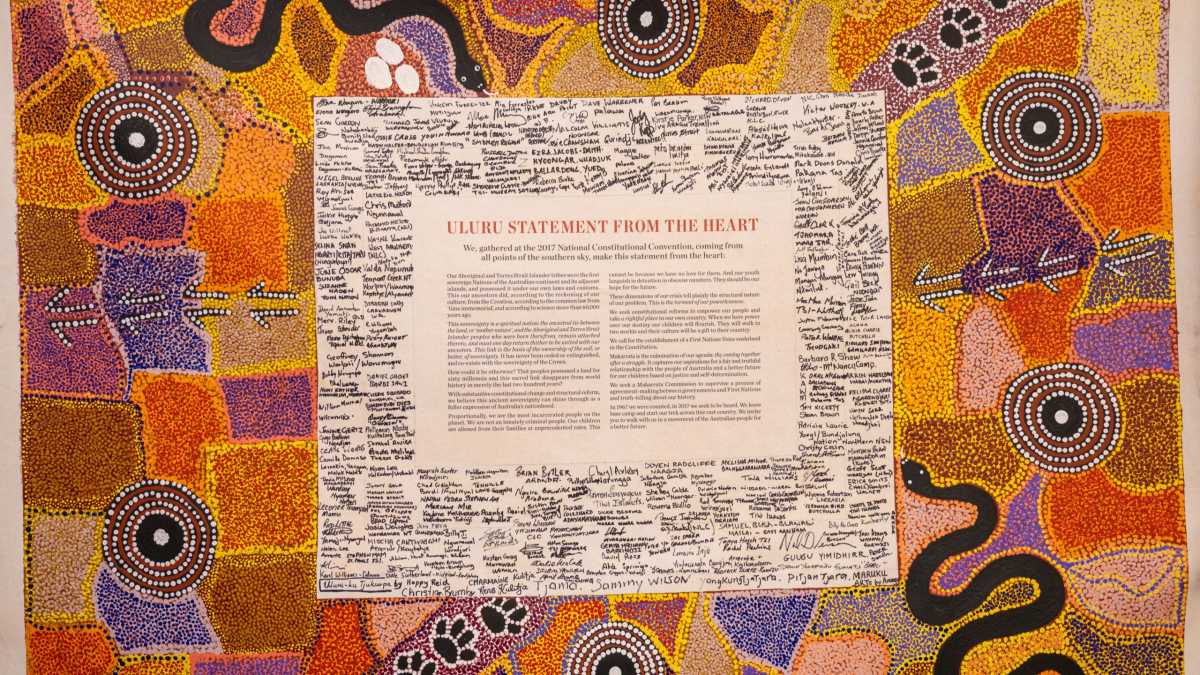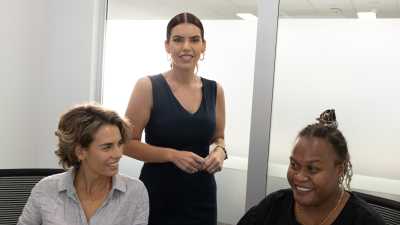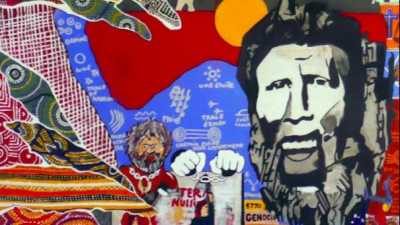The disability sector have come together with the First Nations sector for this interpretation of the Uluru Statement of the Heart.

Image: The Uluru Statement from the Heart surrounded by signatures and Aboriginal and Torres Strait Islander art work.
First Peoples Disability Network (FPDN) Chief Executive and Worimi man, Damian Griffis, believes the Voice could bring real positive change for Australians battling against 'double disadvantage'.
Speaking at FPDN's recent event, Have Your Say Naarm, Mr Griffis said the Voice presents an opportunity for First Nations people living with disability - and the nation more broadly.
Now, in an Australian first, the Uluru Statement from the Heart has been translated in an Easy Read format so more people can read the statement.
Mr Griffis said a Voice to Parliament is "critical" to properly addressing current needs, quoting the late Uncle Lester Bostock, founding elder of FPDN as describing the barriers faced as 'double disadvantage'.
"Being an Aboriginal person living with disability, often you experience discrimination based on ableism and racism," Mr Griffis said.
"Having a mechanism where those voices can be heard is absolutely critical to be able to address some of the needs of people in those communities."
Mr Griffis said disability, at least as a term, is a colonial concept.
"The idea of living in an inclusive society is a natural one for Aboriginal people. That's why we say we have a gift to give the rest of Australia."
"The number of Indigenous people incarcerated living with a disability - subject to a third level of disadvantage - would be a shock to many."
He added Indigenous children living with disability "aren't getting meaningful support, at all", with all evidence pointing to better life trajectory the earlier that support is offered.
Emma Bennison, Chief Innovation Officer, Disability Engagement at Life Without Barriers, has also shared the benefits a Voice to Parliament could have for Australians with disability.
"The Voice represents a new way of working together so we can all benefit from the wisdom and experience of Aboriginal and Torres Strait Islander people with disability."
Read Emma's full reflection here.

Image: Emma on stage at Have Your Say Naarm, speaking as part of the panel.
The Easy Read statement builds on existing accessible community-translated material on the Voice to Parliament to create Plain English, Auslan and accessible video interpretations.
You can download the Auslan Social Media Toolkit here.
You can download the Easy Read Social Media Toolkit here.
You can download the Easy Read Factsheet here.
You can download the Plain Language Social Media Toolkit here.
You can download the Plain Language Factsheet here.
The Minister for the NDIS and Government Services, Bill Shorten MP, welcomed the Easy Read interpretation and commitment from the disability sector for the Voice to Parliament.
“The Uluru Statement of the Heart is a moving document and this interpretation only adds to its significance,” Minister Shorten said.
“Democracy is only free when everyone has access to information, including those with intellectual disability. The Easy Read interpretation is an important part of the Voice to Parliament Referendum.
“As we’ve brought people with disability into the centre of NDIS decision making we’ve seen enormous positivity. We get our best outcomes when we listen to people with lived experience. There is a great deal of respect from the disability sector towards First Nations people and their fight for the Voice."
The Life Without Barriers hub has now released Phase 2 of Referendum resources in multiple languages.


